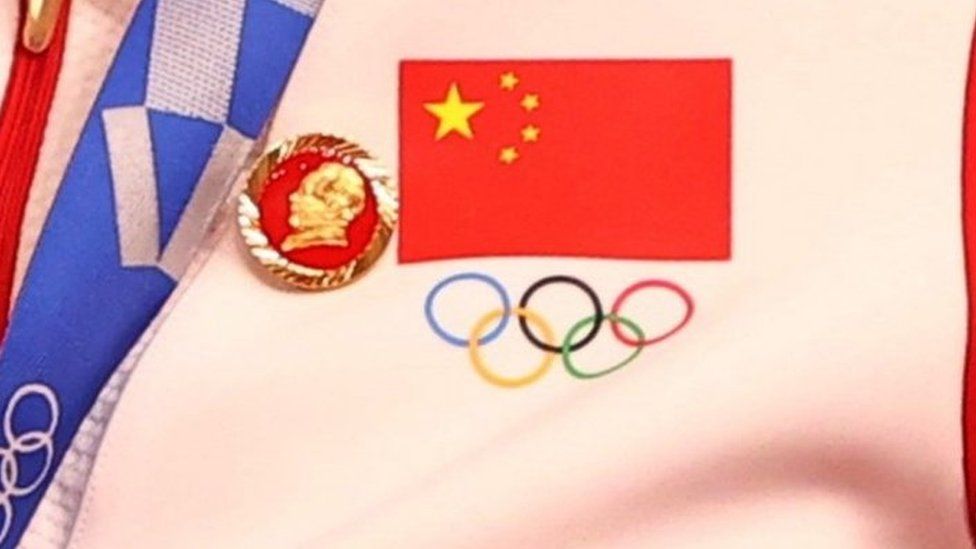
The International Olympic Committee says it is investigating two Chinese cyclists who wore badges featuring an image of the country’s former leader Mao Zedong during a medal ceremony.
A spokesman said the IOC had contacted the Chinese Olympic Committee for a report on the incident.
The pair – Bao Shanju and Zhong Tianshi – won the women’s sprint on Monday.
Such gestures are a potential breach of Olympic rules banning political statements.
Article 50 of the Olympic Charter says “no kind of demonstration or political, religious or racial propaganda is permitted in any Olympic sites, venues or other areas”.
Rules were eased last month to allow athletes to “express their views” before and after competing, paving the way for athletes to take the knee to highlight racism without facing sanction.
But bans remain on gestures or statements during competition or at medal ceremonies.

Mao Zedong ruled China with an iron fist from 1949 until his death in 1976. He was responsible for one of the biggest humanitarian disasters in history when his Great Leap Forward campaign, aimed at modernising China’s agriculture and industry, led to widespread famine and the deaths of up to 45 million people.
Asked about the Chinese cyclists, IOC spokesperson Mark Adams said the committee was “looking into the matter”.
The IOC is also investigating US shot-putter Raven Saunders, who crossed her arms into an X shape when collecting a silver medal.
Saunders, who is black and gay, said her gesture was “the intersection of where all people who are oppressed meet”.
The IOC has asked the US team for more details. Saunders has found widespread support for her action, including from the US Olympic organisers, something the IOC said it would take into account.
Billions of Chairman Mao badges were produced in China in the 1960s. They were made in such huge volumes that eventually their manufacture had to be restricted because they were swallowing up valuable supplies of metals.
They were worn during the Cultural Revolution to show loyalty to Mao, but remain commonplace today.
China’s current leader, Xi Jinping, has sought to invoke Mao’s image, wearing a grey suit made famous by Mao at an event marking the centenary of the party’s founding.
National media highlight Mao fervour – then deletes posts
By Kerry Allen, BBC China Media Analyst
On Monday Chinese national newspaper Global Times posted a picture on Twitter of its cycling gold medallists. The tweet said that “Zhong Tianshi and Bao Shanju were seen wearing Chairman Mao badges when attending the medal ceremony.”
Within an hour, the tweet was deleted, and activists were quick to criticise the newspaper, and the athletes, perceiving that they were promoting political symbolism at the Olympics.
A similar post on the newspaper’s Sina Weibo account, which read “Look! Chairman Mao is on the chest of champions” has also subsequently been deleted. However, it was live for more than six hours, and attracted more than 10,000 “likes”.
Global Times has more than 30 million followers on Weibo, China’s equivalent of Facebook, and so many in China became quickly aware of the athletes’ badges.
They have ignited a lot of debate. Some commenters in China said that they found it admirable that young Chinese athletes want to acknowledge their history. One calls it a “blessing” that the younger generation remember and want to pay tribute to their predecessors.
The legacy of Mao Zedong is so deeply ingrained in China and encapsulated in education, culture and film, that some are praising the athletes as today’s “national warriors”.
However, given Chairman Mao’s controversial legacy, other comments have been much more critical. Some have picked up on the media deleting posts, with one asking if such outlets are “scared” there might be consequences for the athletes.
Many reference the Cultural Revolution, and one calls their move “ignorant”, possibly factoring in that many are still alive, and don’t think favourably of that era.


No comments:
Post a Comment
Note: only a member of this blog may post a comment.